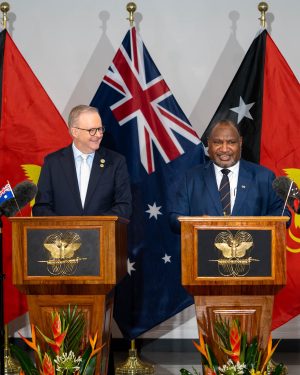Australian Prime Minister Anthony Albanese was in Papua New Guinea (PNG) last week for two purposes. The first was to commemorate the 50th anniversary of PNG’s independence from Australia, and the second was to sign a new defense treaty between Canberra and Port Moresby.
The anniversary went well, the treaty signing less well. The two sides signed a communique, but not the treaty itself yet.
The Pukpuk Mutual Defense Treaty fits into Australia’s aim to cement its position as the security partner of choice for the Pacific Islands. It comes amid a period of heightened security activity by Australia within the region, following on from treaty agreements signed with Tuvalu and Nauru, the stalled Nakamal Agreement with Vanuatu, and ongoing treaty discussions with Fiji.
The key aspects of the Pukpuk Treaty are that it would officially recognize that an armed attack on either country would be considered a danger to the peace and security of both countries. Alongside this, there would be a deepening and modernization of the defense relationship, expanding the interoperability and integration of the two defense forces – including a pathway for PNG citizens to serve in the Australian Defense Force.
However, the most contentious provision is one that seeks to ensure that “any activities, agreements or arrangements with third parties would not compromise the ability of either of the Parties to implement the Treaty.”
This provision aims to advance the longstanding defense mindset that the military presence of adversaries within the Pacific Islands constitutes an unacceptable threat to Australian security. China’s increasing presence in the Pacific is the primary motivating factor driving Australia’s efforts to secure security agreements in the region.
The failure to sign the Pukpuk Treaty during the recent visit has been explained as a simple matter of logistics. The PNG Cabinet has yet to approve the agreement, and due to Independence Day celebrations many Cabinet members were at home in their local communities, meaning that Cabinet could not convene. This is something that should have been obvious to the respective prime ministerial offices when seeking to organize the signing to coincide with the independence day anniversary.
Yet there are several other that explain why the signing of the treaty has been delayed.
The first is that PNG politics, as elsewhere, is a complex game of horse trading. Local politics dominate, and national politics are weak. A major security agreement such as this requires members of the Cabinet to understand – and seek – local implications. In a Cabinet composed of nine different parties the work that Prime Minister James Marape needs to do to bring his ministers on board is immense. Opportunities for ministers to hold out for a bigger slice of the pie for their local communities are significant.
Another reason is that the provisions within the treaty would mark a significant shift from PNG’s nonaligned foreign policy, to one of being aligned with Australia. That may bring about a range of other international entanglements, which PNG may be reluctant to be involved in. The provision on third party agreements not compromising the treaty also goes to the heart of PNG’s sovereignty, something the country is incredibly proud of having gained 50 years ago, and is not keen to weaken.
Alongside this, PNG’s security challenges are not traditional military concerns that preoccupy the Australian Defense Force. PNG has a porous border with Indonesia that is taken advantage of in order to smuggle drugs and weapons. It has a large exclusive economic zone that is subject to a great deal of illegal fishing. And it has an internal turbulence that means that the role of domestic security agencies is far more important than any external concerns.
It is with these issues – rather than conventional warfare – that PNG requires the most assistance. As Michael Kabuni from the Australian National University has written: “[W]hat PNG needs are coastguard-style capabilities: maritime patrols, satellite monitoring, fisheries enforcement, customs and border policing, engineering units and disaster response teams.”
Australia is, of course, a cooperative partner of PNG on all these issues. But what the Pukpuk Treaty may do is take focus and resources away from the things that matter most to PNG, and redirect them toward the things that matter most for Australia.
Australia is obviously nervous at the moment about both the rise of China and the increasing unreliability of the United States. This is leading to an attempt to create a web of security relationships within the Pacific that can protect Australia’s interests in an era of uncertainty. Yet these security interests won’t be met unless they align with the security interests of their Pacific partners.





























